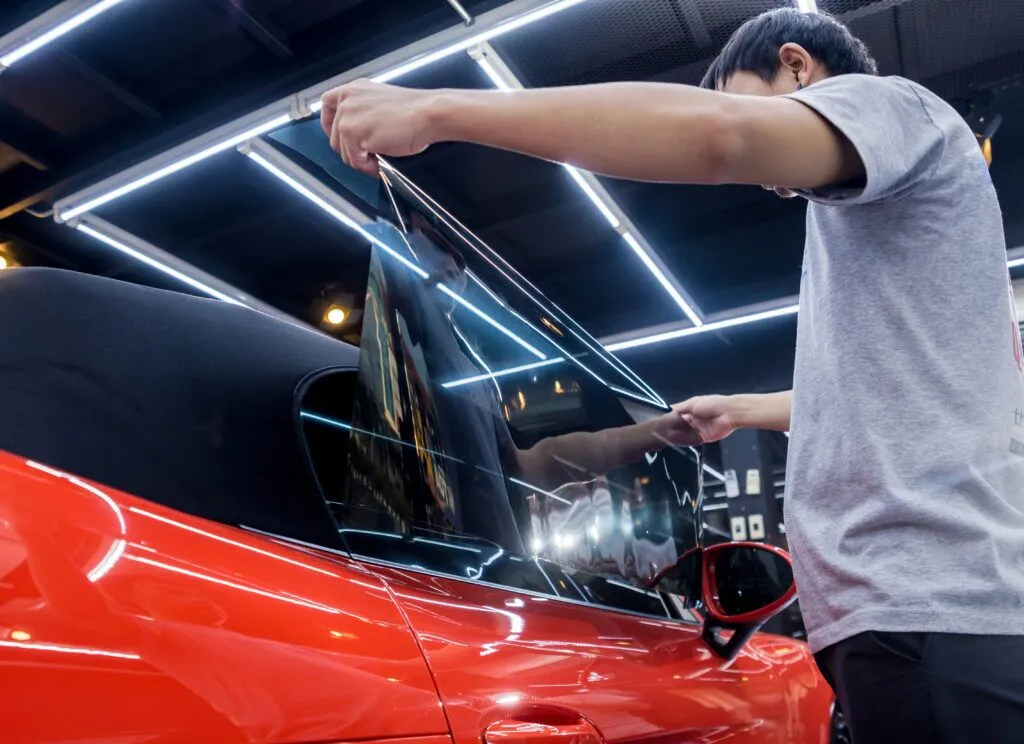Introduction
window tinting is more than just an aesthetic enhancement for your car. It’s a practical upgrade that offers numerous benefits, particularly in combating heat and glare. Whether you’re driving in sweltering summer conditions or parked under the sun, window tinting helps regulate your car’s interior temperature, keeping you cool and comfortable. In this article, we’ll delve into the cooling benefits of car window tinting and explore why it’s an essential feature for every vehicle owner.
How Window Tinting Works
Window tinting involves applying a thin film to the inside of a vehicle’s windows. This film is designed to block a significant percentage of the sun’s ultraviolet (UV) rays and heat. By reducing the amount of sunlight that penetrates your car, window tinting minimizes heat buildup and keeps your cabin cooler.
Modern window tint films are engineered with advanced materials, such as ceramic and metallic layers, which enhance their effectiveness in reflecting heat and UV rays. These materials ensure that your car stays cooler without compromising visibility or aesthetics.
Key Cooling Benefits of Window Tinting
1. Reduces Interior Heat
The primary advantage of window tinting is its ability to reduce interior heat. Untreated windows allow sunlight to pour in, heating your car’s interior to uncomfortable levels. High-quality window tint films can block up to 60% of solar heat, ensuring a cooler and more pleasant driving experience.
This feature is particularly valuable for drivers living in hot climates, where interior temperatures can soar within minutes of parking under the sun. With tinted windows, your car remains significantly cooler, even on the hottest days.
2. Protects Against Harmful UV Rays
Window tinting is not just about heat reduction; it also shields you from harmful UV radiation. Prolonged exposure to UV rays can damage your skin and accelerate the fading and cracking of your car’s interior materials. Window tint films block up to 99% of UV rays, offering both health protection and preserving your vehicle’s interior.
3. Minimizes Air Conditioning Usage
A cooler car means less reliance on air conditioning, which translates to improved fuel efficiency. Excessive use of air conditioning puts extra strain on your vehicle’s engine, leading to higher fuel consumption. By reducing interior temperatures, window tinting helps you conserve energy and save money on fuel.
4. Improves Driving Comfort
Driving in a hot car can be uncomfortable and distracting. The intense heat can make steering wheels and seats unbearably hot, affecting your focus and comfort. Window tinting mitigates these issues by maintaining a cooler cabin, allowing you to drive in comfort regardless of the weather outside.
Additional Benefits of Window Tinting
Enhanced Privacy
Tinted windows provide an added layer of privacy by reducing visibility into your car. This feature is especially useful for protecting personal belongings and maintaining your peace of mind when parking in public spaces.
Reduces Glare
Glare from the sun or headlights of other vehicles can impair your vision and increase the risk of accidents. Window tinting reduces glare, ensuring a safer driving experience.
Protects Vehicle Interiors
Exposure to sunlight can cause your car’s interior materials to fade, crack, or warp over time. Window tinting acts as a protective shield, prolonging the lifespan of your car’s upholstery, dashboard, and other components.
Choosing the Right Window Tinting
When selecting a window tint, consider factors such as the film type, shade, and local regulations. Different tint films, including dyed, metallic, and ceramic options, offer varying levels of heat rejection and durability. Ceramic tints, for example, are known for their superior heat-blocking capabilities and long-lasting performance.
It’s also essential to choose a shade that complies with local window tinting laws. Most jurisdictions have specific limits on how dark your tint can be, especially for front windows and windshields.
Professional vs. DIY Window Tinting
While DIY window tint kits are available, professional installation is highly recommended for optimal results. Professional installers ensure that the film is applied evenly and without bubbles, providing a polished and long-lasting finish. They also help you select the right type of tint for your needs and ensure compliance with local regulations.
Environmental Benefits of Window Tinting
Beyond personal comfort, window tinting offers environmental advantages. By reducing the need for air conditioning, tinted windows help lower your car’s overall energy consumption. This reduction in fuel usage contributes to decreased greenhouse gas emissions, making window tinting an eco-friendly choice for conscientious drivers.
Conclusion
Car window tinting is a simple yet effective solution for combating heat, glare, and UV exposure. Its cooling benefits improve driving comfort, protect your car’s interior, and reduce your reliance on air conditioning. Moreover, tinted windows enhance privacy, safety, and even environmental sustainability.
Investing in professional window tinting is a smart choice for any vehicle owner seeking to improve their driving experience while protecting their car and the environment. Drive cooler, stay protected, and enjoy the journey with high-quality window tinting.
